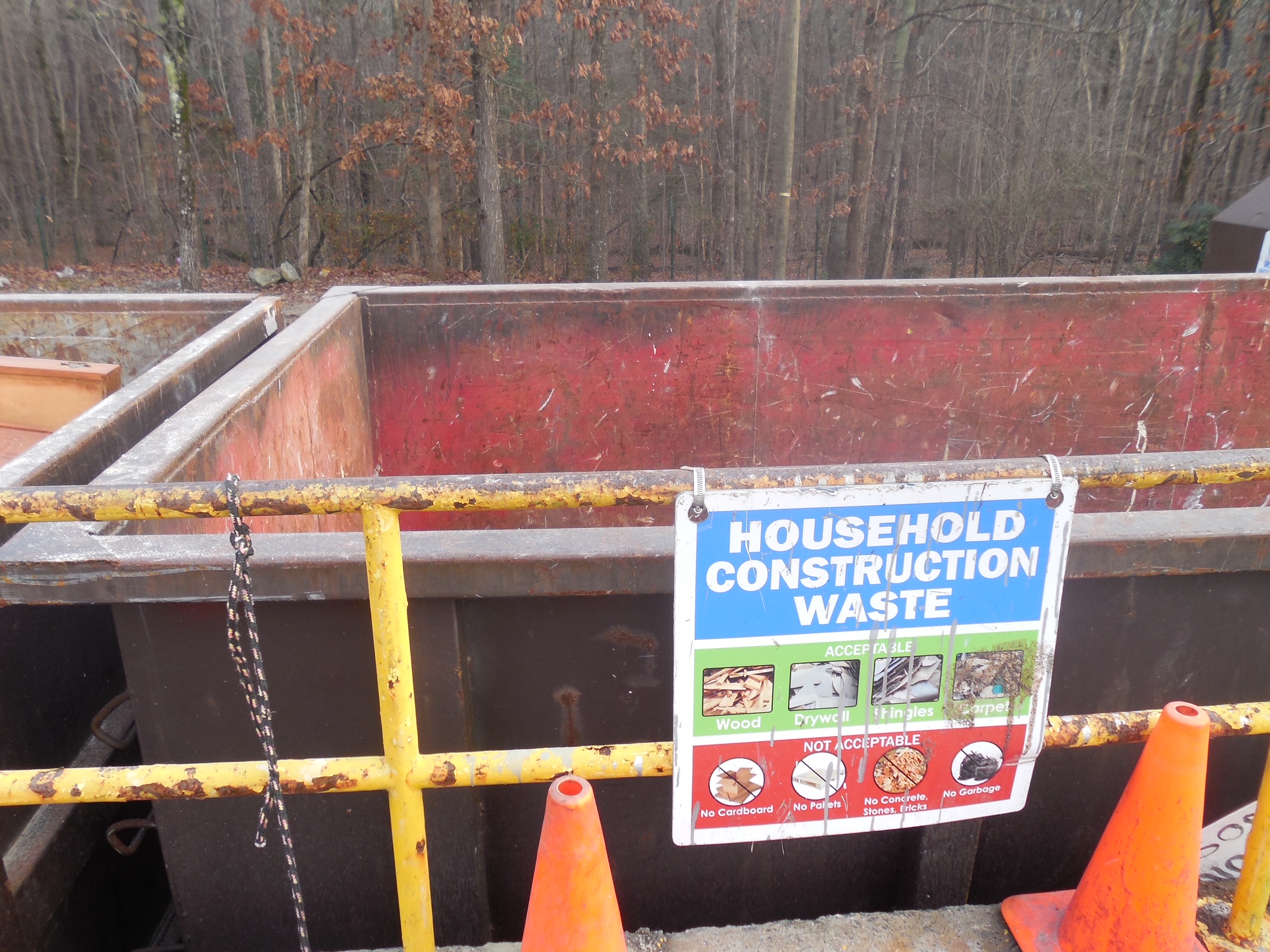The South Wake Landfill plays an important and unheralded role in southern Wake County’s daily existence, offering a place for waste disposal, an opportunity to recycle, and some surprise benefits, too.
To get the lowdown and the data on the landfill, I spoke to Marcus Thompson, Communication Specialist Consultant for Wake County. Located where Apex and Holly Springs meet, the landfill can be found just off NC-55 on Old Smithfield Road in Apex.
It opened in 2008 and is expected to close between 2040-2045 (i.e., when the space allotted runs out). The landfill takes in waste collected from Wake County’s businesses and its approximately 1.1 million residents. The entire property is around 750 acres and includes the recycling drop-off center, closed landfills, and the current active landfill which is estimated to be about 179 acres.
On a daily basis, the landfill accepts around 1,800 tons of waste which translates into approximately 531,000 tons of waste collected each year. Looking at this another way, approximately 175 trucks haul 1,800 tons of waste to the landfill each day. In a year, that’s about 50,000 trucks passing through the landfill’s gates. And, in terms of including all collected items, the recycling drop-off center tallied over 40,000 tons of recyclables in 2023.
Of course, this facility is only as good as the staff who run it. Between the landfill, recycling drop-offs, and the energy plant (more on that below), approximately 50 people work onsite.
I asked Thompson about any misconceptions or misunderstandings about landfills in general that are worth noting for our readers.
He pointed out that it is ultimately up to the consumer to make the decision to separate their waste into recycling and composting in order to divert those items from the landfill. Once a resident decides to throw items in their waste can, those items are destined for the landfill.
“There is no process in place to pull recyclables and compostables out of the South Wake Landfill,” he shared.
With this in mind, it was interesting to hear that over half the waste in the landfill could have been diverted into recycling and composting programs.
“Recycling infrastructure exists to handle the potential recycling volume; however, composting programs are in their infancy,” Thompson said.
Residents should be aware that Wake County has 17 waste and recycling drop-off facilities that are free to use. Recycling creates 20 times more jobs than landfilling. As for waste, Wake County does not haul waste nor do they collect waste at the curbside and they do not own a collection fleet. Curbside collection is managed by the towns.
So, how does the facility work?
Wake County has an interlocal agreement with virtually all of its municipalities to send their waste to the South Wake Landfill. This means the majority of residential waste comes to the South Wake Landfill. A lot of the commercial waste (i.e, restaurant, businesses, etc.) comes to the South Wake Landfill, but some of it is hauled out of the county by private haulers that are contracted to do so.
The towns of Apex, Cary, Morrisville, Holly Springs, and Fuquay-Varina directly haul waste collected from the curbside (i.e., in residential loaders) to the landfill.
The towns of Wake Forest, Rolesville, Garner, Knightdale, Wendell, Zebulon, and the City of Raleigh haul waste from the curbside to the East Wake Transfer Station in east Raleigh where it gets reloaded onto tractor trailers and hauled via highway to the landfill.
Once waste arrives at the landfill, it is taken to a small section (e.g., about 1 acre) of the landfill called the “working face” where waste is received. Using heavy equipment like bulldozers and compactors, the waste is pushed, shredded, compacted, and buried. At the end of every day, the waste is covered with 6”-12” of soil and/or large industrial tarps, as required by permit. This helps to mitigate odors and ward off rodents and other nuisance animals and pests.
In terms of recyclables and as pointed out, Wake County does not provide curbside collection services, but the county does collect recyclables at the convenience centers and transfers those material to one of the two material recovery facilities (MRFs).
After pickup, at the curb or from the convenience centers, mixed recyclables go to a MRF to be sorted and baled. Waste Management and Sunoco are two private MRFs in Wake
County.
Each town can request contamination data from the MRFs. Thompson noted that the last report showed an overall contamination rate of 18% across all drop-off sites.
“In other words, 18% of the items people put into the mixed recycling container were non-recyclable or unaccepted items, which were pulled out and landfilled. This essentially means that approximately 80% of what goes in the container at the curb is recycled,” he noted.
At the South Wake Landfill, the drop-off recycling center is only a collection site as there is no processing taking place there. Items are collected and hauled away to different reprocessors depending on the type of material. Wake County contracts with local vendors/reprocessors who buy/accept the materials from Wake County. That is, household goods/construction materials, glass, cardboard, metals, electronics, paint, etc.
Mixed recycling, including glass, is sent to Waste Management in Morrisville. Construction materials are hauled to construction and demolition landfills within Wake County for disposal. Cardboard is hauled to Sonoco Recycling in Raleigh. Sonoco reprocesses fiber at their own paper mills in the Carolinas. Scrap metal is hauled to TT&E Iron & Metal in Garner. Electronics are hauled to Powerhouse Recycling in Salisbury, N.C. Paint is loaded into ECOFLO tractor trailers and hauled to their facilities in Greensboro.
Thompson shared a compelling example of successful recycling and a model for the future, when he shared that they are turning landfill gas into electricity onsite.
“We have an energy plant onsite generating up to nine megawatts of power 24/7, which can power up to 20,000 homes during off-peak season,” he said.
In addition to turning waste into power, there are other benefits to having a landfill nearby, including easy access to a free waste and recycling disposal facility, public access to the local landfill, and field trips and tours for schools, colleges, environmental groups and anyone else who’s interested. If a landfill tour piques your interest, Thompson pointed to this link for more information and registration: www.wake.gov/landfilltours.
The South Wake Landfill is an essential community fixture, sitting where Apex and Holly Springs meet. It is a safe and effective repository for our waste, a convenient and efficient drop-off recycling center for the myriad things we ultimately no longer need, and a testing ground for turning waste into power.
Interestingly, according to Thompson, the South Wake Landfill is visited by dozens of bald eagles between November and March. This made me think that local waste management is not only critically necessary to our residents, our businesses, and to the community—it’s also where eagles soar.
Recycling Basics
You would be surprised at the number of common plastic items mistakenly tossed in bins for recycling! Things like straws, to-go cups and containers, cutlery, bread bags, bubble wrap, food baggies, and the plastic grocery bags and garbage bags we often use to contain our recyclables!
Check out “Recycling 101” at www.wake.gov (Departments & Government) for information about what can and cannot be recycled, how to prepare your recyclables, the consequences of improper recycling, the biggest recycling contaminants, and more.
Landfill (Trash) Basics
For a list of items (like oil, batteries, tires, etc.) that are banned from disposal in landfills, visit the North Carolina Department of Environmental Quality website at https://www.deq.nc.gov/.
Drop-Off Hours
The hours of the 11 Wake County convenience centers are 7 a.m. – 7 p.m. daily.
The North and South Wake Multi-material Recycling facilities and Household Hazardous Waste facilities are open from 8 a.m. – 4 p.m. Monday through Saturday.
The East Wake Multi-material Recycling and Household Hazardous Waste facilities are open only on Saturdays and Sundays from 8 a.m. – 4 p.m.
There are also two scrap tire facilities open from 8 a.m. – 4 p.m. Monday through Saturday.
Find out where you can drop off specific materials by using the online drop-off locator tool at https://maps.wake.gov/sw/#/.








